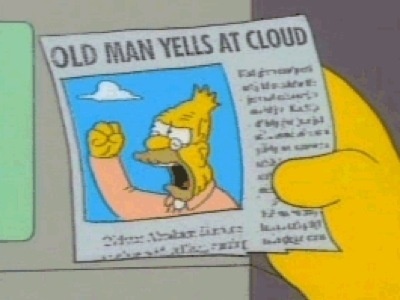Protect heritage arts! Burn the heretical new ones!
 That’s pretty much what I took away from this piece by Richard Mills on The Age.
That’s pretty much what I took away from this piece by Richard Mills on The Age.
The article itself is an extract from a series of essays for the Australia Council, so I’m not entirely sure how it ended up on The Age. It’s possible Mills is completely unaware that his diatribe is being viewed by eyes outside of his regular professional circles, and as such, open to criticism from the industries he so flippantly denounces.
Mills’ piece focuses on the New Media Fund, or specifically, its demolishment. More broadly the article puts forward the need to hold on fiercely to our artistic heritage and that all resources, primarily monetary, should be funnelled into is preservation at the expense of the new, regardless of form or credentials.
You’d think the essay would be entirely academic. Not so. In fact, Mills’ is happy to take low shots at anything he deems “nonsense”:
I opposed it [the New Media Fund] vehemently – and in vain – as it seemed to me just another example of meretricious, self-serving claptrap, which confused content with process, masquerading to the weak-minded as new, with a healthy sense of entitlement to whatever funds might happen to drop from the perch of government.
For a man so deeply involved in the performing arts, an industry propelled by creativity, this is an exceptionally narrow-minded view and, to put it bluntly, an immature one. I cannot see how anyone right of mind would approve of stagnation for any discipline, let alone embrace it with open arms, flowers, and a jar of body chocolate.
That’s not the end of it, however.
I had to read the following paragraph several times before I could fully appreciate its callowness:
No one buys a ticket to the theatre or concert hall to witness something ordinary, something that can be done by any reasonably intelligent person with a modicum of application and training, such as making a computer game or designing an earring.
This does not sound like the opinion of an informed individual. Far from it. What it does sound like is someone with little regard for what they deem insignificant. Anything they don’t understand or unwilling to expend the time to comprehend should be ignored.
The author’s argument can easily be reversed – with the correct training and education, any reasonably intelligent person can play an instrument or perform on stage. Heck, during my younger years I acted in and directed a number of plays, and I can confidently say that the performing arts and games development share a common but positive afflicition – a thirst for creativity. Both serve as fair outlets for the imagination. Something being “older” doesn’t automatically make it faultless or above question, and it certainly should not be wielded as a weapon to cut down perceived upstarts, especially ones that have proven countless times to be the basis of valid and respected industries for creative and commercial success.
I would go so far as to argue that developing a computer game requires more talent than playing an instrument. With enough practise, anyone can play a piano, guitar or violin competently, as can any discipline reliant on muscle memory. Making a competent computer game? People have been at it years and still churn out stinkers. Computers can also put together songs algorithmically that sound decent (we’ve been doing it since 1995), but ask them to make a computer game of any significant depth and you’re going to struggle.
But I digress. I don’t want to argue that games are superior in some way to traditional arts, because I don’t believe it to be true. They have their merits and drawbacks, and can be appreciated in myriad ways.
When Roger Ebert (perhaps naively) took to the Internet with his opinion of games and their lack of artistic merit, he eventually relented. While he did not capitulate on his view of games not being art, he did admit his interest in them was minimal, to the point that provided with the hardware and a title to play (thatgamecompany’s Flower), he still declined to give it a shot. As such, could not really assert his judgement as law, and the roaring flamethrowers of gamers everywhere withered in respectful silence. An excellent compromise, I feel.
As long as attitudes like Mills’ prevail, games will never be taken seriously at the higher levels of government where decisions on funding take place. Sadly, I believe it will take a generational shift to oust this view once and for all, or at least temper it with some much-needed humility and common sense.
Let us defend our heritage arts [The Age]


